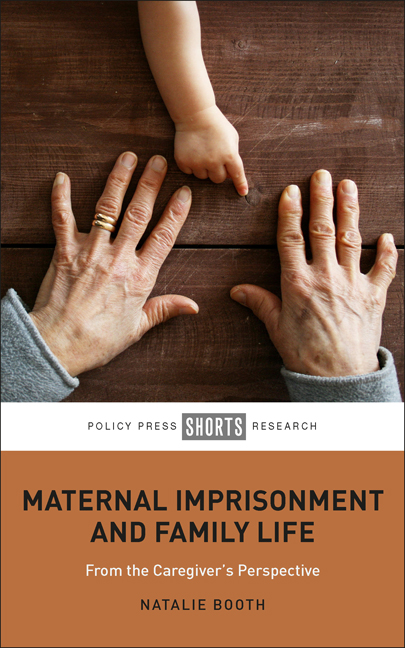Book contents
- Frontmatter
- Contents
- List of Tables
- Acknowledgements
- Preface: Linda’s Story
- One The Landscape of Maternal Imprisonment: Caregiving and Family Life
- Two Researching the Caregiver’S Lived Experiences
- Three Family Constructions and Caregiving Practices
- Four Renegotiating Family Life: Caregiving in the Aftermath of the Mother’S Imprisonment
- Five Navigating the Criminal Justice System
- Six Social Support, Familial Stigma and Release
- Seven Kin Caregiving: Occupying a Disenfranchised Status While Serving the Family Sentence
- Eight Reflections on the Research Process
- References
- Index
Seven - Kin Caregiving: Occupying a Disenfranchised Status While Serving the Family Sentence
Published online by Cambridge University Press: 10 March 2021
- Frontmatter
- Contents
- List of Tables
- Acknowledgements
- Preface: Linda’s Story
- One The Landscape of Maternal Imprisonment: Caregiving and Family Life
- Two Researching the Caregiver’S Lived Experiences
- Three Family Constructions and Caregiving Practices
- Four Renegotiating Family Life: Caregiving in the Aftermath of the Mother’S Imprisonment
- Five Navigating the Criminal Justice System
- Six Social Support, Familial Stigma and Release
- Seven Kin Caregiving: Occupying a Disenfranchised Status While Serving the Family Sentence
- Eight Reflections on the Research Process
- References
- Index
Summary
Introduction
Throughout this book, the lived experiences of relatives and friends (caregiving kin) looking after the children of female prisoners have been examined. Their honest accounts of their everyday lives during maternal imprisonment have contributed new insights that will be reviewed in this chapter. Importantly, listening to caregivers has developed our conceptual understanding of the ways in which the ‘family sentence’ is served from a ‘disenfranchised social status’. It is crucial to incorporate the perspectives of caregivers into policy and practice in order to facilitate a greater inclusion and response to the challenges they experience. To achieve this, recommendations are proposed towards the end of this chapter after the key findings from the study are discussed.
What has been learned about the family sentence?
The literature talks about imprisonment having ‘collateral’ and ‘unintended’ consequences for children and families (Jardine, 2018), and this study intended to shed light on the experiences of maternal imprisonment and family life from the caregiver's perspective. In particular, the first part of this chapter shows how applying Morgan's (1999) theoretical lens of ‘family practices’ has improved our understanding of the scope and nature of the ‘family sentence’. This concept has been developed throughout the book to draw attention to the many ways in which the punishment associated with the mother's imprisonment has significant implications for the lives and experiences of caregivers and the wider family.
Doing caregiving
Children were looked after by grandparents and female relatives and friends, and aside from the three (step)father-caregivers in the sample, participants were all maternal kin. Other academics have found that researching prisoners’ families is a gendered terrain as it is generally women who visit and support their incarcerated relatives (Codd, 2002, 2008; Condry, 2007a, 2007b) and look after prisoners’ children (Caddle and Crisp, 1997; Raikes, 2016). Expanding on this, it is likely that the ‘family sentence’ experienced during maternal imprisonment may disproportionately impact relatives on the mother's side of the family, rather than paternal relatives.
Relatedly, the findings indicate the importance of considering life before the mother was removed and detained. All the imprisoned mothers were actively involved in their children's lives prior to prison and most of them were primary caregivers.
- Type
- Chapter
- Information
- Maternal Imprisonment and Family LifeFrom the Caregiver's Perspective, pp. 157 - 180Publisher: Bristol University PressPrint publication year: 2020



